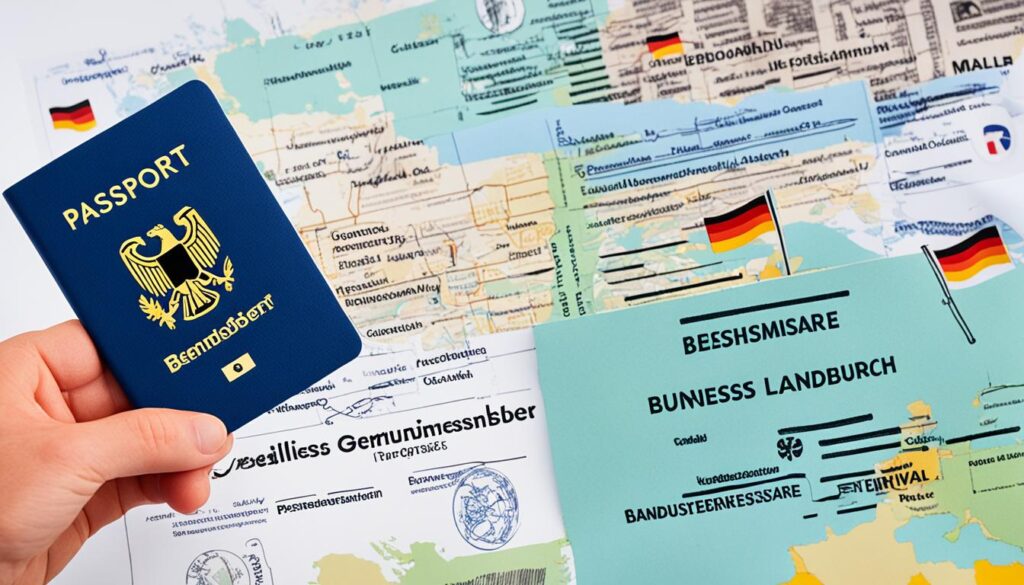Forming a company in Germany, specifically a GmbH (Gesellschaft mit beschränkter Haftung), is a process that offers both simplicity and legal safeguards. With its well-structured regulatory environment, efficient business setup is possible, allowing foreign investors to engage in company incorporation Germany with confidence. Starting a business in Germany involves several key steps that require adherence to local regulations and thorough understanding of the business atmosphere.
To navigate this journey successfully, it’s essential to comprehend the various aspects involved, from the types of business structures available to the specific documents needed for registration. Legal considerations such as share capital requirements and the important role of the Handelsregister (official company register) must also be understood. Proper guidance and local expertise can prove beneficial in ensuring a smooth formation process, as adherence to compliance not only fosters sustainability but also accelerates operational timelines. For more details on the requirements and guidelines for setting up a company, check out this comprehensive guide.
Key Takeaways
- GmbH provides limited liability for shareholders, making it an attractive option for many investors.
- Proper accounting practices are crucial for meeting regulatory requirements.
- Company registration typically takes 4 weeks, while tax and trade registration can align with this timeline.
- Understanding the roles of a notary and the Handelsregister is vital for effective company formation.
- International clients can expect to commence operations in Germany within around 8 weeks, depending on their engagement.
- Share capital and compliance with local laws are important ongoing considerations for new businesses.12
Unlock Investment Opportunities Abroad!
Understanding Germany’s Business Environment
The business environment in Germany is characterized by a robust framework aimed at ensuring fairness, efficiency, and innovation. Entrepreneurs must navigate various German business regulations that dictate the formation and operation of companies. One important aspect is understanding the compliance protocols outlined in the Commercial Code and German Company Law. These regulations cover essential areas such as business registration and financial reporting, reflecting the standards that new businesses must meet to succeed in this competitive landscape.
Overview of Business Regulations in Germany
Germany has a clear and structured approach to business regulations, essential for fostering a stable economic environment. Each type of business entity has specific requirements; for example, a Gesellschaft mit beschränkter Haftung (GmbH) mandates a minimum share capital of €25,000. This regulation underscores the necessity of adequate financial backing in starting a business, emphasizing compliance in Germany3. Effective compliance not only helps in adhering to legal standards but also aids in building credibility among clients and business partners.
Furthermore, partnerships do not impose a minimum share capital requirement, offering flexibility for new entrepreneurs. Regardless of the chosen structure, all businesses must open a German bank account and possibly make notary appointments for specific arrangements3. This multi-step process requires an understanding of the legal landscape, which can greatly benefit foreign investors researching opportunities in Germany.
Importance of Compliance for New Businesses
New businesses in Germany must prioritize compliance to thrive. Following the Germany Commercial Code is crucial, as it governs essential financial operations such as bookkeeping and audits4. Additionally, adhering to labor laws and social security requirements is vital for businesses that hire employees. Understanding these aspects ensures a sustainable operation embedded within the long-term business environment Germany aims to promote.
Overall, navigating the complex regulations of Germany is paramount for gaining a competitive edge. For a comprehensive overview of types of business entities available, you can explore further information here.
Choosing the Right Legal Structure

When starting a business in Germany, understanding the available company types in Germany is crucial for making informed decisions. Entrepreneurs face a variety of options, including the GmbH (Limited Liability Company), AG (Joint Stock Company), and sole proprietorships. Each of these structures offers distinct characteristics regarding liability, share capital requirements, and tax responsibilities.
Types of Companies Available in Germany
The GmbH formation in Germany requires a minimum share capital of €25,000, with at least €12,500 deposited prior to registration5. This structure is favored by many due to its limited liability features, where shareholders’ liabilities are confined to their contributions6. For those seeking lower capital requirements, the Unternehmergesellschaft (UG) allows formation with just one euro, although it mandates retaining 25% of annual profits until it accumulates €25,000 to convert into a GmbH7. Large enterprises might opt for an AG, which requires a share capital of €50,000 and allows shares to be publicly traded7.
Factors Influencing Your Choice of Legal Structure
When engaging in business structure selection, factors like liability protection, nature of the business, investment opportunities, and growth expectations are essential. For instance, while a sole proprietorship may offer simplicity, it comes with unlimited personal liability for all business debts6. In contrast, GmbHs offer enhanced credibility, which attracts potential investors7. Additionally, compliance requirements such as notarization and shareholder meetings influence the legal structure selection5.
Germany Company Formation: Step-by-Step Guide

Embarking on the journey of business setup in Germany involves a series of crucial steps. Initially, potential entrepreneurs must evaluate essential factors such as the company’s location, available market opportunities, and the scale of investment. This assessment lays the groundwork for meeting the company registration requirements effectively.
Initial Considerations Before Company Registration
Before diving into registration, it’s imperative to prepare the necessary documents for GmbH formation. Entrepreneurs should compile essential paperwork, including the Articles of Association, valid identification proofs of shareholders, and bank certificates confirming the deposited share capital, which must be at least €25,000 for a GmbH89. Proper documentation minimizes delays and streamlines the incorporation process, providing clarity on all legal obligations involved in forming a company in Germany.
Key Documents Required for Formation
The typical documents required for formation include:
- Articles of Association outlining the company’s purpose and structure.
- Identification proofs of all shareholders and directors.
- Bank certificates confirming the share capital deposit.
- Trade registration form filled out correctly.
Meeting these company registration requirements ensures that the subsequent steps toward finalizing the business setup in Germany proceed smoothly. Utilizing resources such as online company formation checklists can significantly help in tracking necessary documents and procedures.
Securing a Company Name

Securing a unique company name is a critical step in the company formation process in Germany. It is essential to ensure that the chosen name adheres to local regulations and reflects the business’s essence. With proper company name registration, entrepreneurs can avoid potential legal disputes and create a solid brand identity.
How to Check Name Availability
To determine name availability Germany, founders should consult the Handelsregister, the country’s official business registry. The Handelsregister offers essential guidelines for proper naming conventions, allowing potential business owners to confirm the uniqueness of their desired name. This process also includes ensuring that the name does not infringe on existing trademarks, which are protected under German law, requiring an application at the Deutsches Patent—und Markenamt (DPMA) for trademark protection10. Registering a name considered a trademark can lead to enhanced brand protection and marketing opportunities in the competitive marketplace.
Importance of Name Reservation
Business name reservation is vital to safeguarding your brand’s identity. Reserving a company name prevents other entities from claiming it and protects your business against possible future conflicts. Additionally, by confirming name availability Germany and securing a reservation, companies are able to establish a professional presence sooner, which is highly beneficial since trademark applications generally take about three to four months for registration10. A company name that aligns with its mission or products can significantly enhance its market visibility, making name reservation an indispensable aspect of any business’s formation strategy.
The careful selection of a business name lays the foundation for future growth, underlining its importance in the dynamic landscape of business in Germany. Entrepreneurs must prioritize this step, as it not only affects company image but also can have legal ramifications relating to trademark law11.
Notary Appointment and Document Certification

A notary public is essential for company formation in Germany, facilitating the verification and certification of critical documents. The role of notary in company formation involves ensuring that all required paperwork, including the Articles of Association, conforms to legal standards. This process is not only vital for establishing a company but also streamlines registration with the Handelsregister.
The Role of a Notary in Company Formation
When setting up a business, a notary appointment in Germany is mandatory due to the requirement of notarizing various documents. CEOs of the company must attend this appointment, which typically lasts around half an hour for a model protocol business and about an hour for those with statutes12. Founders are responsible for bringing valid identity papers as well as the necessary formation documents12. Notaries ensure that everything is in order; they check for any convictions of the CEO within the last five years, as per the GmbH Act requirements12.
Several challenges can occur during the notary appointment. Issues might arise from expired identity documents, incomplete necessary documents, or the absence of the CEO. Language barriers or non-compliant articles of association can complicate matters further12. Therefore, being fully prepared is crucial.
Unlock Investment Opportunities Abroad!
Steps to Schedule an Appointment with a Notary
Scheduling a notary appointment in Germany begins with gathering essential documents such as copies of the passports and address proof for all shareholders and directors13. Following this, the founders can reach out to local notary services Germany to set a date. Waiting times for notary appointments can vary but typically range from a few days to a week12. The costs incurred at the notary appointment can depend on factors like company type and share capital, with incorporation packages for UG starting at around 499 € and GmbH at 799 €14. It is essential to remember that notary fees and costs for authorities are often not included in these packages14.
After completing the appointment, businesses will receive two certified copies of the company documents, which are crucial for subsequent steps like opening a bank account and applying for a VAT number13. This emphasis on document certification notary not only secures the registration process but also lays a solid foundation for your newly formed company.
| Service | Cost (€) | Details |
|---|---|---|
| UG Incorporation Package | 499 | Starting price for setting up a UG. |
| GmbH Incorporation Package | 799 | Initial fee required for GmbH setup. |
| Trade Office Registration | 13-31 | Fees depending on location. |
| Certified Copies of Documents | Variable | Required for opening a business account. |
| Notary Appointment Fees | Variable | Dependent on services used and company type. |
Understanding these processes ensures that businesses can navigate the complex requirements of establishing a company in Germany effectively121413.
Opening a Business Bank Account
Establishing a business bank account in Germany is a crucial step for any new venture. It facilitates smooth transactions and ensures compliance with the country’s banking requirements. Entrepreneurs must be prepared to present essential documentation for a corporate account setup in Germany, which often includes identification, a trade license, and financial details of the business.
Requirements for Setting Up a Business Account
To open a business bank account Germany, one typically needs to provide various pieces of documentation. Key requirements often include:
- Proof of identity
- Trade licenses
- Partnership agreements
- Articles of association or certificates of incorporation
- List of shareholders
Specialized services, such as corporate loans, may affect the overall cost of maintaining the account. Monthly fees for business accounts in Germany can vary widely, from free up to €6.90 or more based on bank features. Moreover, direct banks frequently waive the SCHUFA requirement, which benefits founders with limited credit histories or liquidity15.
The Importance of Proper Financial Management
Financial management for businesses is essential to establishing trust and ensuring robust cash flow. Having a dedicated business bank account allows for clear differentiation between personal and business finances, which simplifies bookkeeping and tax compliance. For corporations with multiple shareholders, utilizing a business account for joint transactions is highly advisable15.
Opening a business bank account usually takes about 1-3 days after submitting all required documentation16. Many banks offer conveniences such as free transactions and easy access to cash withdrawals. Notable banks such as Commerzbank support nearly 30,000 corporate customer organizations, and Postbank provides tailored services for small businesses, including free management fees for an initial six-month period17.
Registering Your Company with the Handelsregister
Successfully completing the Handelsregister registration in Germany is a crucial step for businesses aiming to operate legally and efficiently. This registration legitimizes your company and provides a unique company identification number required for all commercial activities. Understanding the registration documents required is essential for a smooth application process.
Documents Required for Registration
The necessary registration documents required for entry into the Handelsregister include the notarized Articles of Association, proof of the management structure, and evidence of share capital deposit. The basic information filed in the Handelsregister for a GmbH includes the legal form, business objective, CEO details, and the minimum share capital requirement of €25,00018. The processing time for examining and entering a GmbH or UG can range from a few working days to several weeks19.
Understanding the Handelsregister Number
Upon successful registration, companies receive a Handelsregister Number. This number serves as a crucial identifier, facilitating operations while ensuring compliance with German business regulations. It is vital for operational transparency and helps maintain an updated business profile within the Handelsregister system. Companies must ensure that any changes—such as modifications in power of attorney, address, or CEO—are promptly updated to reflect accurate information, ensuring smooth business operations19. The effective handling of these updates is essential for ongoing compliance and can prevent potential legal complications.
| Document | Description |
|---|---|
| Articles of Association | Notarized document outlining the company’s structure and regulations. |
| Proof of Management Structure | Document confirming the individuals managing the company. |
| Evidence of Share Capital | Proof that the required capital is deposited in a bank account. |
For more details about the entire company registration process and essential steps involved, check this guide on German business registration.
Ensuring you have all required documents ready and understanding the implications of the Handelsregister Number will pave the way for successful business operations in Germany191820.
Conclusion
Efficient company formation in Germany involves a series of well-defined steps that entrepreneurs need to navigate successfully. By understanding the local business environment, selecting the right legal structure, and ensuring compliance with registration requirements, anyone can streamline the business setup process. For example, the GmbH is the most common limited liability structure, requiring a minimum share capital of €25,000, which highlights the importance of choosing the correct legal framework right from the start21.
Additionally, Germany’s robust economic landscape features financial support such as cash grants for new facilities, making it attractive for startups to take root22. By utilizing local resources and seeking professional advice, entrepreneurs can effectively navigate the Germany Company Formation steps, enhancing their prospects for success. Cities like Berlin, Munich, and Hamburg provide vibrant ecosystems that further support budding businesses22.
In summary, following the structured steps laid out throughout this guide will facilitate a smoother transition into the German market. With careful planning and adherence to regulations, it’s possible to establish a flourishing business in one of the world’s most stable trading economies22.
Unlock Investment Opportunities Abroad!
FAQ
What is the first step in the Germany company formation process?
What are the different types of legal structures available for company formation in Germany?
How can I check the availability of my desired company name in Germany?
Why is it essential to have a notary involved in the company formation process?
What documents are required to register a company with the Handelsregister?
Is opening a business bank account necessary for new companies in Germany?
How does compliance with German regulations benefit new businesses?
What are some key financial management practices for new businesses in Germany?
What unique identifier will my company receive after registering with the Handelsregister?
Source Links
- https://www.houseofcompanies.io/post/step-by-step-guide-to-establishing-company-in-germany
- https://www.tetraconsultants.com/jurisdictions/register-company-in-germany/
- https://www.houseofcompanies.io/post/company-formation-made-simple-in-germany
- https://parakar.eu/use-cases/starting-company-abroad/germany
- https://www.liesegang-partner.com/knowhow/corporate-law/understanding-the-legal-structure-of-a-gmbh-in-germany
- https://www.clevver.io/business-registration-in-germany-the-ultimate-guide/
- https://www.firma.de/en/company-formation/how-to-choose-the-right-legal-form-for-your-business-in-germany/
- https://stripe.com/resources/more/start-gmbh-germany
- https://www.companyformationgermany.com/
- https://www.firma.de/en/business-management/how-can-i-protect-my-companys-name-in-germany/
- https://www.welcome-center-germany.com/post/set-up-a-company-in-germany-a-complete-guide
- https://www.firma.de/en/company-formation/the-notary-appointment-for-company-incorporation-what-founders-need-to-know/
- https://readymadegermany.com/preparing-for-a-notary-appointment-to-form-a-company-in-germany/
- https://www.clevver.io/products/clevvercompany-incorporation-service/germany-incorporation/
- https://www.firma.de/en/company-formation/opening-a-business-bank-account-comparison-and-faqs/
- https://gmbh-ug.com/company-formation/
- https://expats.de/en/bank-account/company/
- https://wisebusiness-germany.com/company-formation-in-germany/
- https://www.firma.de/en/company-formation/german-limited-liability-companies-gmbh-ug-and-the-handelsregister-from-registration-to-removal/
- https://rue.ee/jurisdictions/germany/
- https://se-legal.de/company-law-advice-germany/establishing-a-company-in-germany/?lang=en
- https://www.wolterskluwer.com/en/expert-insights/doing-business-in-germany

Comments